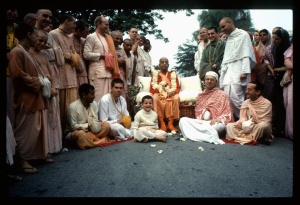CC Antya 2.5-6: Difference between revisions
No edit summary |
(Vanibot #0054 edit - transform synonyms into clickable links, which search similar occurrences) |
||
| Line 19: | Line 19: | ||
<div class="synonyms"> | <div class="synonyms"> | ||
''sākṣāt-darśane'' | ''[//vanipedia.org/wiki/Special:VaniSearch?s=sākṣāt&tab=syno_o&ds=1 sākṣāt]-[//vanipedia.org/wiki/Special:VaniSearch?s=darśane&tab=syno_o&ds=1 darśane]'' — by direct meeting; ''[//vanipedia.org/wiki/Special:VaniSearch?s=prāya&tab=syno_o&ds=1 prāya]'' — almost; ''[//vanipedia.org/wiki/Special:VaniSearch?s=saba&tab=syno_o&ds=1 saba]'' — all; ''[//vanipedia.org/wiki/Special:VaniSearch?s=nistārilā&tab=syno_o&ds=1 nistārilā]'' — delivered; ''[//vanipedia.org/wiki/Special:VaniSearch?s=nakula&tab=syno_o&ds=1 nakula]-[//vanipedia.org/wiki/Special:VaniSearch?s=brahmacārīra&tab=syno_o&ds=1 brahmacārīra]'' — of a ''brahmacārī'' named Nakula; ''[//vanipedia.org/wiki/Special:VaniSearch?s=dehe&tab=syno_o&ds=1 dehe]'' — in the body; ''[//vanipedia.org/wiki/Special:VaniSearch?s=āviṣṭa&tab=syno_o&ds=1 āviṣṭa] [//vanipedia.org/wiki/Special:VaniSearch?s=ha&tab=syno_o&ds=1 ha]-[//vanipedia.org/wiki/Special:VaniSearch?s=ilā&tab=syno_o&ds=1 ilā]'' — entered; ''[//vanipedia.org/wiki/Special:VaniSearch?s=pradyumna&tab=syno_o&ds=1 pradyumna]-[//vanipedia.org/wiki/Special:VaniSearch?s=nṛsiṁhānanda&tab=syno_o&ds=1 nṛsiṁhānanda]'' — Pradyumna Nṛsiṁhānanda; ''[//vanipedia.org/wiki/Special:VaniSearch?s=āge&tab=syno_o&ds=1 āge]'' — in front of; ''[//vanipedia.org/wiki/Special:VaniSearch?s=kailā&tab=syno_o&ds=1 kailā]'' — made; ''[//vanipedia.org/wiki/Special:VaniSearch?s=āvirbhāva&tab=syno_o&ds=1 āvirbhāva]'' — appearance; ''[//vanipedia.org/wiki/Special:VaniSearch?s=loka&tab=syno_o&ds=1 loka] [//vanipedia.org/wiki/Special:VaniSearch?s=nistāriba&tab=syno_o&ds=1 nistāriba]'' — I shall deliver all the fallen souls; ''[//vanipedia.org/wiki/Special:VaniSearch?s=ei&tab=syno_o&ds=1 ei]'' — this; ''[//vanipedia.org/wiki/Special:VaniSearch?s=īśvara&tab=syno_o&ds=1 īśvara]-[//vanipedia.org/wiki/Special:VaniSearch?s=svabhāva&tab=syno_o&ds=1 svabhāva]'' — the characteristic of the Supreme Personality of Godhead. | ||
</div> | </div> | ||
Latest revision as of 20:15, 19 February 2024

A.C. Bhaktivedanta Swami Prabhupada
TEXTS 5-6
- ’sākṣāt-darśane’ prāya saba nistārilā
- nakula-brahmacārīra dehe ‘āviṣṭa’ ha-ilā
- pradyumna-nṛsiṁhānanda āge kailā ‘āvirbhāva’
- ’loka nistāriba’,—ei īśvara-svabhāva
SYNONYMS
sākṣāt-darśane — by direct meeting; prāya — almost; saba — all; nistārilā — delivered; nakula-brahmacārīra — of a brahmacārī named Nakula; dehe — in the body; āviṣṭa ha-ilā — entered; pradyumna-nṛsiṁhānanda — Pradyumna Nṛsiṁhānanda; āge — in front of; kailā — made; āvirbhāva — appearance; loka nistāriba — I shall deliver all the fallen souls; ei — this; īśvara-svabhāva — the characteristic of the Supreme Personality of Godhead.
TRANSLATION
Śrī Caitanya Mahāprabhu delivered almost all the fallen souls by directly meeting them. He delivered others by entering the bodies of great devotees, such as Nakula Brahmacārī. And He delivered still others by appearing before them, as in the case of Nṛsiṁhānanda Brahmacārī. “I shall deliver the fallen souls.” This statement characterizes the Supreme Personality of Godhead.
PURPORT
The Lord always manifested His āvirbhāva appearance in the following four places: (1) the house of Śrīmatī Śacīmātā, (2) wherever Nityānanda Prabhu danced in ecstasy, (3) the house of Śrīvāsa (when kīrtana was performed), and (4) the house of Rāghava Paṇḍita. Lord Caitanya Himself appeared in these four places. (In this connection, one may consult text 34.)